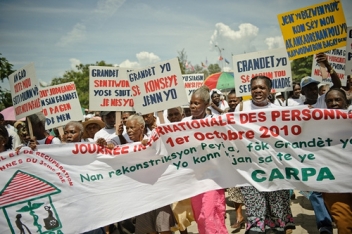2015 is getting closer and the process to develop a new framework to succeed the Millennium Development Goals (MDGs) is taking shape. The MDGs came out of the Millennium Declaration which was agreed to by world’s leaders at the Millennium Summit in New York City in September 2000.
In February 2011, Sir Mark Malloch Brown, former UK Minister of State in the Foreign and Commonwealth Office and one of the key architects of the MDGs stated: “I and several of (Kofi Annan’s) staff literally went into the proverbial windowless committee room and wrote the MDGs”.
This radical statement clearly points out an essential error of the MDGs and leads to an important concern for the new process: how will global society, led by the UN, ensure that the new framework includes voices of all the people in the world?
For the HelpAge network this translates into a more important concern: how do we make sure that the voices of older people are both heard and echoed in the new framework?
United Nations: Leading the way
In July 2011, a general release from the UN Secretary specified: “The post-2015 development framework is likely to have the best development impact if it emerges from an inclusive, open and transparent process with multi-stakeholder participation.”
The outcomes of the Rio plus 20 summit are likely to influence the post-2015 goals. The outcomes, known as the Sustainable Development Goals, are based on the three pillars of social, economic and environment.
The UN, led by the General Secretary, has taken the following steps to shape an all-inclusive and participatory process:
- United Nations Development Programme (UNDP) and United Nations Department of Economic and Social Affairs (UNDESA) have been mandated to lead the work on the post-2015 framework.
- A Task Team consisting of a number of technical experts from the UN System will deliver a report by May 2012 to guide the work of a high-level panel which will be appointed by a Secretary General in June-July 2012.
- The high-level panel will oversee a reporting process to go to the General Assembly of the United Nations to underpin the intergovernmental process leading up to 2015 and beyond.
- Finally, the UN Millennium Campaign has been established to act as an outreach mechanism for the global civil society to participate in.
Supporting regional and national consultations
During the framework process, UNDP will provide guidance and to national consultations in 50 countries facilitated by UN Country Teams. The aim of these consultations is to take into account opinions on the post-2015 framework from people around the world, particularly the poor and the vulnerable.
UNDP will also facilitate thematic regional and global consultations to discuss cross-cutting issues such as inequalities and gender, population dynamics, growth and employment and governance and accountability. The process towards the post-2015 framework aims to ensure that:
- Voices of people directly affected by poverty and injustice are amplified.
- A shared global vision for the future of people and the planet, as well as clear strategies that can be employed at local, national, sectoral and regional levels can be established.
- National governments and intergovernmental processes are influenced to align with aspirations of civil society and hold actors accountable for their commitments.
Ageing, MDGs and the post-MDG process
Today 60 per cent of the world’s older people live in developing countries. By 2050 this will have risen to 80 per cent. Worldwide, about 11 per cent of the world’s population is aged over 60 and by 2050 the number will reach 22 per cent or 2 billion people. Finally, people aged 80 and over are the fastest-growing population group projected to increase almost fourfold by 2050.
Despite these statistics, issues of ageing and older people living in poverty are not addressed by MDG programmes and related policy processes.
For the HelpAge International network, the process towards the new framework represents a pivotal opportunity to mainstream attention to ageing and its implications into the new framework; thereby influencing future international and national policies to be more age-friendly.
We believe the process towards a new framework needs to take into account the experience of exclusion of older people and other groups from the indicators and targets of the current MDGs.
What is the HelpAge network doing?
There is a real opportunity for HelpAge’s Affiliates to inform and influence the post-2015 framework. We are working on developing a set of recommendations to ensure that ageing is included in the framework. These can be used to lobby national consultations and the UN process. Some of the initial recommendations are:
- The post-2015 must take data on population dynamics and ageing into account in the 2015 high-level review.
- Ensure that the voices and experiences of older people and their organisations are heard in the consultation and review process.
- Ensure that the monitoring and evaluation process for the post-2015 framework is inclusive of all groups including older people.
Affiliates can also directly engage with the Beyond 2015 campaign; a global campaign aiming to influence the creation of a post-2015 development framework. The campaign has developed a number of essential must-haves, a toolkit for national deliberations and is organising events to facilitate discussions.
Beyond 2015 is inviting the civil society to engage in the campaign by joining one of the campaign task teams and for organisations to submit their positions on the post-2015 global development agenda.
This is a great chance to build an ‘inclusion agenda’ to underpin the future development framework and we are working with a range of civil society groups to develop this together.
HelpAge will work closely with our global network of Affiliates to ensure that voices of older people are heard in the forthcoming National consultations.
What can you do?
- Read more about HelpAge and our involvement with the MDGs
- Sign our Age Demands Action petition to support older people’s rights
